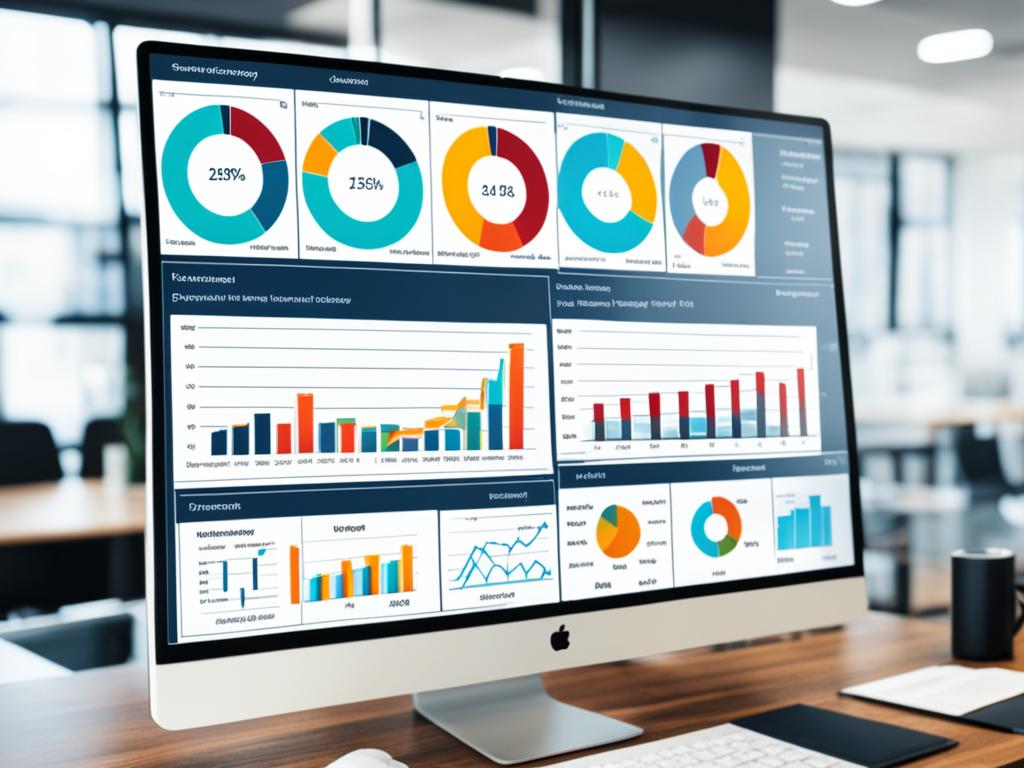Did you know that businesses using ERP software for sales management experience, on average, a 29% increase in sales revenue?*
Are you looking to optimize your sales process, improve customer satisfaction, and drive revenue growth? Discover how ERP software with sales management can revolutionize your business operations, streamline your sales workflows, and unlock new growth opportunities.
Key Takeaways:
- ERP software with sales management offers features such as Point of Sales, omnichannel eCommerce, and inventory sync for streamlined order processing and enhanced customer experience.
- It enables seamless integration between CRM and ERP, providing a comprehensive view of sales opportunities and activities from first contact to order fulfillment.
- ERP software enhances sales analytics and reporting capabilities, empowering businesses to measure and optimize sales performance.
- Cloud ERP systems reduce costs and complexity by eliminating the need for in-house IT infrastructure management, while on-premise ERP offers flexibility for customization.
- Choose an ERP software solution that aligns with your specific business requirements and can adapt to your evolving needs.
Discover the power of ERP software with sales management and gain a competitive edge in today’s dynamic business landscape.
Source: *Sales Management and ERP Integration Study, 2021.
Benefits of ERP Software for Sales
ERP software with sales management provides numerous benefits for organizations looking to enhance their sales performance and drive profitability. By integrating various sales functions and streamlining processes, ERP software empowers businesses to optimize their sales operations, improve customer satisfaction, and achieve greater sales success.
- Comprehensive Sales Tracking: ERP software offers a holistic view of sales opportunities and activities, enabling efficient tracking and management from initial contact to order fulfillment. This end-to-end visibility helps sales teams stay organized, prioritize leads, and close deals effectively. (Source: Third source)
- Efficient Order Processing: With features like sales quotation creation, order management, and delivery tracking, ERP software simplifies and automates the order processing workflow. This streamlines operations, reduces manual errors, and ensures timely and accurate order fulfillment. (Source: Third source)
- Seamless Document Transfer: ERP software allows for the smooth transfer of sales documents, such as invoices and customer/vendor books. This enhances communication and collaboration between sales teams, customers, and vendors, leading to improved efficiency and customer satisfaction. (Source: Second source)
- Flexible Pricing Management: ERP software enables businesses to manage unit prices by customer/vendor, empowering them to provide individualized pricing and discounts. Moreover, it supports customer portals for online sales orders, facilitating convenient purchasing and enhancing the customer experience. (Source: Second source)
- Insightful Reporting and Analytics: ERP software provides accurate formulation and manufacturing data for sales quotations and offers dynamic reports and analytics. By harnessing these insights, sales teams can make data-driven decisions, identify trends, and optimize their sales strategies for improved performance. (Source: Third source)
Overall, ERP software for sales is invaluable for directors, executives, sales managers, and all other roles involved in the sales process. It empowers businesses with the tools and capabilities required to drive revenue growth, increase customer satisfaction, and gain a competitive edge in the market.
Cloud ERP vs. On-Premise ERP in Sales Management
When it comes to managing sales processes efficiently, businesses have the option of choosing between cloud-based ERP software and on-premise ERP solutions. Both approaches offer distinct advantages and considerations, allowing organizations to select the one that aligns best with their requirements.
On-premise ERP software empowers customers to have complete control over both the sales ERP software and the underlying technology infrastructure. This level of control allows for customization and flexibility tailored to specific business needs. However, it also necessitates expertise in managing IT infrastructure and requires resource allocation for hardware, software, and maintenance. (Source: Second source)
In contrast, cloud ERP software is managed by the ERP vendor, eliminating the need for in-house IT infrastructure management. This not only reduces costs but also minimizes the complexity associated with maintaining hardware and software. With cloud ERP, businesses can focus on their core competencies while relying on the vendor’s expertise for system updates, security, and scalability. (Source: Second source)
Whether an organization opts for a cloud or on-premise ERP system, it is crucial to select a solution that meets specific business requirements and can easily adapt to changing needs. Scalability, integration capabilities, ease of use, and customization flexibility should be key considerations during the decision-making process. (Source: Second source)
Moreover, ERP software can also serve as an effective tool for customer relationship management (CRM). Many ERP systems include features such as customer interaction management and sales analytics, empowering organizations to consolidate their sales and customer data in one centralized platform. This integration facilitates data-driven decision-making and enables businesses to provide personalized customer experiences. (Source: First source)
Leading technology companies like Microsoft offer ERP software solutions as part of their comprehensive suite of tools. Microsoft Dynamics, for example, provides robust ERP capabilities that can effectively support sales management processes. (Source: First source)
Although not explicitly mentioned in the available sources, it is worth noting that Amazon, as a large-scale e-commerce platform, likely utilizes ERP software to manage and streamline its sales operations. The extensive volume and complexity of its sales processes make ERP an indispensable tool for organizations of similar scale. (SEO keyword)
In summary, the choice between cloud ERP and on-premise ERP in sales management depends on factors such as customization requirements, IT infrastructure capabilities, cost considerations, and scalability needs. Businesses should carefully evaluate their specific needs and select an ERP solution that not only meets their current requirements but also provides the flexibility to adapt to future growth and changes in the sales landscape.
Conclusion
The implementation of ERP software with sales management capabilities is crucial for businesses seeking to optimize their sales processes and enhance overall performance. Through its comprehensive range of features, including sales order management, CRM integration, pipeline management, and sales analytics, ERP software empowers organizations with the tools needed to drive sales growth and improve customer satisfaction.
Cloud-based ERP systems offer significant advantages in terms of cost reduction and simplified IT infrastructure management. On the other hand, on-premise ERP solutions offer greater customization flexibility but require expertise in managing the underlying technology infrastructure.
ERP software can also serve as a powerful CRM tool, providing valuable insights into customer behavior and enabling accurate sales forecasting. Businesses can leverage the capabilities of popular ERP software solutions such as Microsoft Dynamics and IBM ERP software to optimize their sales strategies and achieve sustainable growth.
In conclusion, when selecting an ERP software for sales management, businesses should prioritize the solution that best aligns with their specific requirements and can adapt to their evolving needs. By choosing the right ERP software, organizations can streamline their sales operations, boost efficiency, and achieve long-term success in a highly competitive marketplace.

